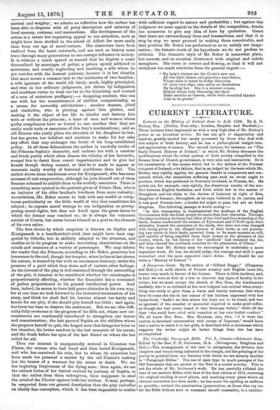CURRENT LITERATURE.
Lectures on the History of Ireland down to A.D. 1534. By A. G. Richey, Esq. (Dublin, Ponsonby ; London, Simpkin and Marshall.)— These lectures have impressed us with a very high idea of Mr. Richey's power as an historical writer. He has the gift of impartiality and candour, greatly needed but rarely possessed by those who deal with this subject of Irish history, and he has a philosophical insight into, and appreciation of causes. The second lecture, for instance, on "The Early Church History of Ireland," in which Mr. Richey discusses the modifications which the tribal system of Irish society compelled in the Roman form of Church government, is very able and instructive. So is his examination of the causes which led to the failure of the Norman conquest of Ireland,—its failure, that is, as judged by the testa which Mr. Richey very rightly applies, the general benefit to conquerors and con- quered, which, the immediate suffering past, such an event ought to produce, which was produced in Southern Scotland, in Prussia, dm. He points out, for example, very rightly, the disastrous results of the con- flict between English feudalism and Irish tribal law in the matter of Strongbow, and his claim to the throne of Leinster In right of Eva, daughter of Dermot ; Strongbow, as he says, believed in its justice, and it was good Norman law; a feudal fief might so pass, but not an Irish kingdom. The following passage is worth noting :—
" In this transaction is foreshadowed the dealings of the English Government with the Irish people for more than four centuries. Through the same confusion between the office of the chief and the ownership of the lands, James confiscated the estates of Tvrconnel and O'Neill upon their attainder, treated the occupiers of the lands, who were not even charged with being privy to the alleged treason of their lords, as not possess- ing any estate in their lands, asserted them to be mere tenants-at-will, and capable of being expelled from their homes at the pleasure of the Crown, which, by the felony of the 'landlord' had resumed the fee, and thus cleared the northern counties for the plantation of Ulster."
We hope that Mr. Richey may be encouraged to undertake a more important work. He has, we should judge, the courage and skill to pus unscathed over the ignes suppositos cineri doloso. Why should he not write a "History of Ireland "?






























 Previous page
Previous page